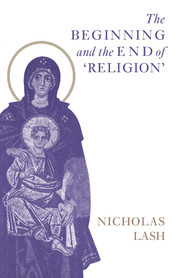Book contents
- Frontmatter
- Contents
- Preface
- PART ONE A MEETING-PLACE FOR TRUTH
- PART TWO EMERGING FROM MODERNITY
- 4 Observation, revelation and the posterity of Noah
- 5 On what kinds of things there are
- 6 Contemplation, metaphor and real knowledge
- 7 When did the theologians lose interest in theology?
- 8 Anselm seeking
- 9 Creation, courtesy and contemplation
- 10 Hollow centres and holy places
- 11 Hoping against hope, or Abraham's dilemma
- 12 Eagles and sheep: Christianity and the public order beyond modernity
- 13 Incarnation and determinate freedom
- 14 Beyond the end of history?
- List of works cited
- Index
4 - Observation, revelation and the posterity of Noah
Published online by Cambridge University Press: 05 March 2012
- Frontmatter
- Contents
- Preface
- PART ONE A MEETING-PLACE FOR TRUTH
- PART TWO EMERGING FROM MODERNITY
- 4 Observation, revelation and the posterity of Noah
- 5 On what kinds of things there are
- 6 Contemplation, metaphor and real knowledge
- 7 When did the theologians lose interest in theology?
- 8 Anselm seeking
- 9 Creation, courtesy and contemplation
- 10 Hollow centres and holy places
- 11 Hoping against hope, or Abraham's dilemma
- 12 Eagles and sheep: Christianity and the public order beyond modernity
- 13 Incarnation and determinate freedom
- 14 Beyond the end of history?
- List of works cited
- Index
Summary
RELIGIO LAICI
Coined in France a hundred years before, the terms ‘theism’ and ‘deism’ moved into English only at the end of the seventeenth century, remaining interchangeable until well into the eighteenth. As indicating what John Dryden called ‘the principles of natural worship’, these terms stood doubly opposed to ‘atheism’, on the one hand and, on the other, to what was becoming known as ‘revealed religion’.
According to the Oxford English Dictionary, it is in 1682, five years before the publication of Newton's Principia, that ‘deism’ makes its first appearance, in the preface to Dryden's Religio laici. Both poem and preface delineate, for political purposes, certain abuses of human reason. At a time of constitutional crisis Dryden, the devout Tory and (at this date) still loyal adherent of the established Church, takes issue with certain forms of dogmatism and sectarian rationalism which seem to him ‘to threaten the values of human society and to menace the stability of the state’.
One of his targets, then, is ‘deism’. The error of the deist is ‘the belief that nothing of unique value is embedded in tradition or history, that it is possible to wipe the slate clean (as Descartes did) and start all over again, and by the pure exercise of reason to discover “all ye know, and all ye need to know”’.
- Type
- Chapter
- Information
- The Beginning and the End of 'Religion' , pp. 75 - 92Publisher: Cambridge University PressPrint publication year: 1996
- 1
- Cited by



